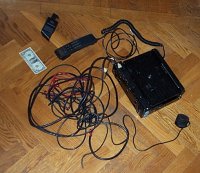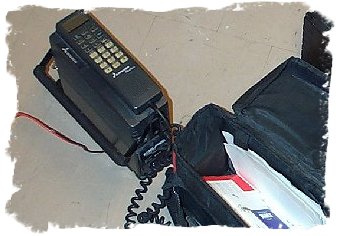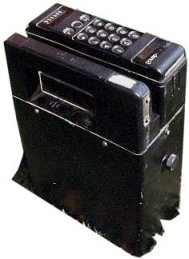|
HOME
IMAGES
STORIES
EVENTS
LINKS
ABOUT
CONTACT
|
MOBILE PHONE HISTORY
Mobile phones are common now and every person seems to have one.
But it hasn´t always been like that.
Once in the mid 80´s we had to split a huge box on two persons, and mobile meant that you could install the big box in your car and, when you were finished with your trip you had to disconnect the thing (using tools) and carry, really carry the damn thing away for your friend to install.

The first CEO that invested in one (they did cost about $ 2.500)
used to call from his car telling us "I´ll be there with you in a moment.
I´M CALLING FROM MY CAR! Shhhhhh…."
This is what we did write down for the board to read and make decisions about
any mobile phone investments at all:
This calculation is a specification of demands and mobile phones
investments at the department. It shows that the recent demand is Eight pieces
of mobile units (included one purchased in 1986).

Handy set with big enough carrying bags.
The way of using them means that every unit is shared by two persons.
The calculation shows a return on investment of 0.1 years.
Calculation:
The major time for travelling is done by car, whereby this time is not
usable for customer care and during this time you are not available for any
kind of contact.
Installation of mobile phones means that all the time you spend on
the road is usable for customer contacts, and you are also available for
recieving other information.
The availability increases as follows:
Number of days on the road: 120 (=1000 hours)
Other hours travelling a year= 125 hours.
Available time for customer care:
Now: at office 100 days (=800 hours)
During travel (at customers) a year 10% of 875 hrs= appr. 90 hours.
Totally appr. 890 hours.
With mobile phones:
Of the time on the road is 100% used=250 hours.
The availability is hereby increased with 250/890= 30% increase.
Furthermore, the mobile phones can be used efficiently at time visiting customers, which wasn´t added to those 30%. An important issue is that the work can be better planned at the office/ car since the time on the road can be used for phone calls.
Today the customer visits result in 5-6 big contracts a year a person.
The increased time for customer contacts should, calculated moderately, result in an increase of one big contract extra a year a person.
Income
One new big contract a year will increase the yearly income with
$ 25000.
Cost (year 1)
Purchase $ 2.500:-, Phone co. contract $ 200. Fees for phone calls $ 300. Totally $ 3.000.
So the pay back time of the investment will be about 3000/2x25000= approximately 0.1 years.
BLAH.

|
|
